

Twitter. Growth Mindset Videos: 10 Inspiring TEDTalks to Share With Your Kids. Looking for a fabulous resource for igniting discussion about having a growth mindset with your kids?
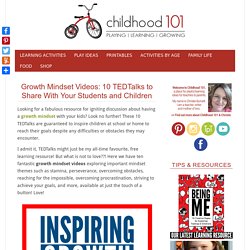
Look no further! These 10 TEDTalks are guaranteed to inspire children at school or home to reach their goals despite any difficulties or obstacles they may encounter. I admit it, TEDTalks might just be my all-time favourite, free learning resource! So you want your students to have a Growth Mindset? There has been much talk about Growth Mindset the past few years. Many teachers recognize that there are a lot of students who exhibit a fixed mindset. I often wonder when we introduce another educational term into the mainstream how many different ways the term can be misinterpreted. Empower Students Through Individual Conferences. Building Growth Mindset in the Classroom: Assignments From Carol Dweck - Inside School Research.
Washington, D.C.
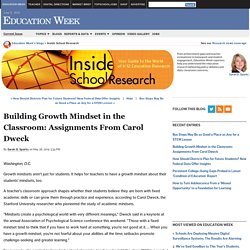
Growth mindsets aren't just for students. It helps for teachers to have a growth mindset about their students' mindsets, too. A teacher's classroom approach shapes whether their students believe they are born with fixed academic skills or can grow them through practice and experience, according to Carol Dweck, the Stanford University researcher who pioneered the study of academic mindsets.
How One School Changed Its Math Culture, Starting With Teachers. So you want your students to have a Growth Mindset? Math? Yes, You Can! Fostering a Growth Mindset. “Why is it that as a society we’re willing to freely admit that we’re not competent mathematicians but would disguise any struggle we had with being literate?
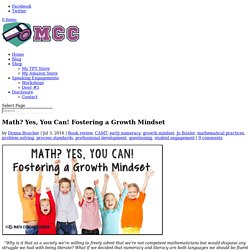
What if we decided that numeracy and literacy are both languages we should be fluent it?” Leslie Minton, What If Your ABCs Were Your 123s? How society views math ability At many of my workshops, I tell a version of a scenario Leslie Minton outlines in the first chapter of her book What if Your ABCs Were Your 123s? It goes something like this: Suppose you are standing around talking with a group of folks at a cocktail party. 500 Internal Server Error. Teaching students basic knowledge about the brain’s potential can have a positive impact on their motivation, grit, and achievement. In particular, explicitly teaching them that learning changes the structure and function of their brains can be transformational in building a stronger belief in the value of working hard to master new material. Teachers who explain these findings report that the knowledge has a positive effect on students’ perceptions of their abilities as well as on their expectations for success.
Examples From Elementary Classrooms Diane Dahl of Texas, a participant in our brain-based teaching program, enjoys teaching her elementary students about the brain and strategies for learning. Students learn what neurons, dendrites, and axons are and how connections between neurons created by axons and dendrites create learning. Next, Dahl tells her students that when we learn, it’s important to connect new information with something we already know. Best Growth Mindset Books for Kids, As Chosen by Teachers. One easy way to encourage growth mindset is through engaging, purposeful read-alouds.
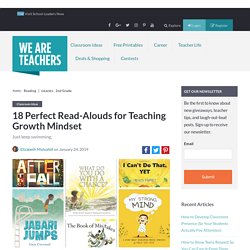
Here are some of our favorite growth mindset books for kids, all of which can help jumpstart conversations about failure, risk-taking, and persistence. 1. Resources for Teaching Growth Mindset. Rushing for Interventions. I see students working in groups all the time… Students working collaboratively in pairs or small groups having rich discussions as they sort shapes by specific properties, students identifying and extending their partner’s visual patterns, students playing games aimed at improving their procedural fluency, students cooperating to make sense of a low-floor/high-ceiling problem…..

When we see students actively engaged in rich mathematics activities, working collaboratively, it provides opportunities for teachers to effectively monitor student learning (notice students’ thinking, provide opportunities for rich questioning, and lead to important feedback and next steps…) and prepare the teacher for the lesson close. Graphics - Free Downloads - North Star PathsNorth Star Paths. Click the link below for a high resolution pdf file for “A Few of My Favorite UDL Things” Click the link below for a high resolution pdf file for “9 reasons to use visuals” 9 reasons to use visuals graphic.
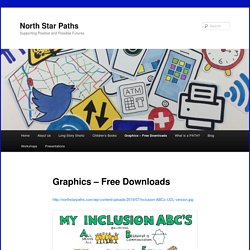
Carol Dweck Explains The 'False' Growth Mindset That Worries Her. Carol Dweck has become the closest thing to an education celebrity because of her work on growth mindset. Her research shows that children who have a growth mindset welcome challenges as opportunities to improve, believing that their abilities can change with focused effort. Kids with fixed mindsets, on the other hand, believe they have a finite amount of talent that can't be altered and shy away from challenges that might reveal their inabilities. Dweck believes educators flocked to her work because many were tired of drilling kids for high-stakes tests and recognized that student motivation and love for learning was being lost in the process.
But Dweck is worried that as her research became more popular, many people oversimplified its message. When Kids Have Structure for Thinking, Better Learning Emerges. By sixth grade a few students are starting to include some strategies for thinking in their maps, such as “concentrate” or “don’t get caught up in things that aren’t relevant.” But by ninth grade many students include specific strategies for thinking on their concept maps, including “making connections,” “comparing” and “breaking things down.” Ritchhart studied 400 students at a school focusing on cultivating a culture of thinking.
The study had no control group, but Ritchhart could chart development of metacognition from 4th-11th grades. Six Tips For Creating A Positive Learning Environment In Your Classroom. In Classroom Instruction That Works, 2nd edition I write that when students enter your classroom at the beginning of the term there are two questions in their minds – “Can I do the work?”
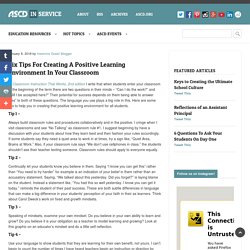
And “Will I be accepted here?” Their potential for success depends on them being able to answer “yes” to both of these questions. The language you use plays a big role in this. Education Update:Chasing Happiness in the Classroom:Minds for Math. What do Students Lose by Being Perfect? Valuable Failure. I Think This New NPR Video Is A ‘Must-Watch’ For Every Teacher: “The Power of Expectations” Growth Mindset: How to Normalize Mistake Making and Struggle in Class. Classroom Posters: Reinforcing Growth Mindset and Positivity with Visual Cues. The 'Brain' in Growth Mindset: Does Teaching Students Neuroscience Help? - Inside School Research. Teaching students the science of how their brains change over time can help them see intelligence as something they can develop, rather than innate and unchangeable, finds a new analysis of 10 separate studies online in the journal Trends in Neuroscience and Education.
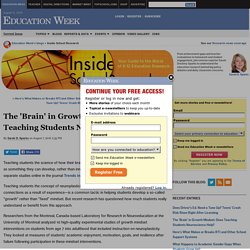
Teaching students the concept of neuroplasticity—the ability of the brain to make new neural connections as a result of experience—is a common tactic in helping students develop a so-called "growth" rather than "fixed" mindset. But recent research has questioned how much students really understand or benefit from this approach. Researchers from the Montreal, Canada-based Laboratory for Research in Neuroeducation at the University of Montreal analyzed 10 high-quality experimental studies of growth mindset interventions on students from age 7 into adulthood that included instruction on neuroplasticity.
To Up Students' Math Ability, Try Working on Their Teachers' Growth Mindset - Teaching Now. How One School Changed Its Math Culture, Starting With Teachers. To Up Students' Math Ability, Try Working on Their Teachers' Growth Mindset - Teaching Now. Establishing A Culture Of ‘Can’ In Your Classroom. How Can Brain-Based Learning Change the Classroom? Changing students' attitudes to mathematics improves test scores: Study shows for first time that a free, online course can change students' mindsets towards their mathematical abilities, leading to increased academic achievement. The Low Kids and The High Kids. Teaching is challenging and personal and important work.
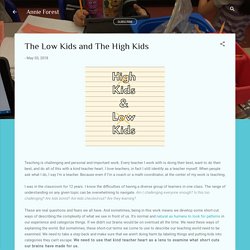
Every teacher I work with is doing their best, want to do their best, and do all of this with a kind teacher heart. I love teachers, in fact I still identify as a teacher myself. When people ask what I do, I say I'm a teacher. Because even if I'm a coach or a math coordinator, at the center of my work is teaching. I was in the classroom for 12 years. These are real questions and fears we all have. 'Too Often, Teachers Deny Their Own Expertise': John Hattie on the Educator Mindframe - Teaching Now. After 20 years of researching student achievement, John Hattie thinks he's found the factor that most affects students' success: how educators think about teaching and learning.
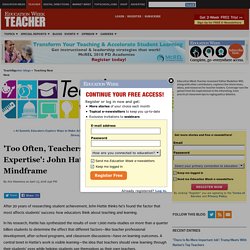
In his research, Hattie has synthesized the results of over 1,000 meta-studies on more than a quarter billion students to determine the effect that different factors—like teacher professional development, after-school programs, and classroom discussions—have on learning outcomes. Posters Archives - YouCubed. Ww2.kqed. How To Help Every Child Fulfil Their Potential.
Seeking Challenges in Math. I was working with a grade 7 teacher and his students a while back. The teacher came to me with an interesting problem, his students were doing quite well in math (in general) but only wanted to do work out of textbooks, only wanted to work independently, and were very mark-driven. The teacher wanted his students to start being able to solve non-routine problems, not just be able to follow the directions from the textbook, and he wanted his students to see the value in working collaboratively and to listen to each other’s thoughts. Our conversations quickly moved to the topic of mindsets.
It sounded like many of his students had fixed mindsets, and didn’t want to take any risks. Rethinking Giftedness Film. We decided to work with Citizen Film to make this short film after many years of my being a professor at Stanford and hearing from students about the labels they had received growing up. Many of the students had been labelled as “gifted” or “smart,” when they were in school, and these labels, intended to be positive, had given them learning challenges later in life. Most people realize that it is harmful to not be labelled as gifted when others are. The labelling of some students sends negative messages about potential, that are out of synch with important knowledge of neuroplasticity showing that everyone’s brains can grow and change. Week One – Talking Points & Math Mindset. Since taking Jo Boaler’s course, “How to Learn Math,” I continually think about how I can effectively gauge my student’s mindset at the beginning of the school year.
Carol Dweck Explains The ‘False’ Growth Mindset That Worries Her. Week One – Talking Points & Math Mindset. Week One – Talking Points & Math Mindset. Praise The Process Build A Growth Mindset. Recognizing and Overcoming False Growth Mindset. All educators care deeply about their students' motivation. They want them to love learning, and to be resourceful and persistent in the face of learning challenges. They don't want their students to lose heart when they get stuck, make mistakes, or receive disappointing grades. In this context, the growth mindset entered the scene. A growth mindset is the belief that you can develop your talents and abilities through hard work, good strategies, and help from others.
It stands in opposition to a fixed mindset, which is the belief that talents and abilities are unalterable traits, ones that can never be improved. “This is easy”: The little phrase that causes big problems. By Tracy J. Zager, posted March 27, 2017 — The first time I visited Debbie Nichols’s first- and second-grade multi-age classroom, she had assigned a challenging problem that involved a paragraph of text and a large graphic. How to Integrate Growth Mindset Messages Into Every Part of Math Class. Talking About Failure: What Parents Can Do to Motivate Kids in School. Is failure a positive opportunity to learn and grow, or is it a negative experience that hinders success? Math attitude influences math achievement. If the prospect of math homework makes you feel hopeless, it may be bad news for your final grade. On the other hand, a few good grades could foster a positive attitude — which could result in better grades down the line, a new study shows. Education Week. Education Week.
The Neuroscience of Trust. Companies are twisting themselves into knots to empower and challenge their employees. They’re anxious about the sad state of engagement, and rightly so, given the value they’re losing. Consider Gallup’s meta-analysis of decades’ worth of data: It shows that high engagement—defined largely as having a strong connection with one’s work and colleagues, feeling like a real contributor, and enjoying ample chances to learn—consistently leads to positive outcomes for both individuals and organizations.
The rewards include higher productivity, better-quality products, and increased profitability. #TMC14 GWWG: Talking Points Activity – cultivating exploratory talk through a growth mindset activity. This activity is the one I am most excited about bringing to #TMC14 and to the Group Work Working Group. My intention is to blog more about how this goes during the morning sessions. I also hope that participants will blog more about this too and contribute resources to the wiki. Exploratory talk is the greatest single predictor of whether group work is effective or not, yet most symmetrical classroom talk (peer talk) is either cumulative (positive but uncritical) or disputational (merely trading uncritical disagreements back and forth).
This activity is based on Lyn Dawes’ Talking Points activity but has been adapted for use within a restorative practices framework.